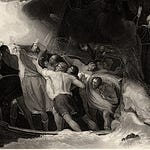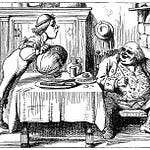Here’s the scene. You’re Alonso, the king of Naples, and you have a very uneasy conscience. Many years ago, your greed and ambition got the better of you, and you helped a wicked man set his brother Prospero, the rightful Duke of Milan, on board a rotten and leaky hull, with his baby daughter Miranda, to die at sea without the people of Milan suspecting it. Now you too have been at sea, and a terrific storm appears to have smashed your ship to flotsam and jetsam, while you and your two conspirators and a few other courtiers have washed ashore on an apparently uninhabited island. You have had no food all day and no fresh water to drink. But that is the least of your sorrows. You believe that you have lost your son in the storm, a young man of great promise and high and noble virtues. You hardly want to live, except in the hope against hope that somehow he is still alive.
As it happens, that lad Ferdinand is in fact alive and has fallen in love with Miranda, now a young and beautiful and innocent woman, for she and Prospero, by “providence divine,” did not die at sea. But you don’t know that. And suddenly, before your eyes, as Shakespeare’s stage direction for “The Tempest” has it, “enter strange SHAPES, bringing in a banquet; and dance about it with gentle actions of salutations; and, inviting the king &c. to eat, they depart.” Music in Shakespeare often suggests the harmony of the world as made by God; sweet music helps to restore the soul and revive the heart. That’s the case here too, and so the King allows himself to be persuaded: he will partake of the banquet, despite his sadness. But then comes an act of justice, our Word of the Week. Alonso and the other two men do not deserve gentle treatment. They are guilty of two murders, even though God has saved their victims from destruction. So the spirit Ariel — the name in Hebrew means “Lion of God” — enters with thunder and lightning, in the guise of a harpy, and he claps his wings upon the table, and the banquet vanishes — probably with smoke and a trap door; special effects for the Elizabethan stage! Then he speaks the lines below, our Poem of the Week.
The greatest dramatist who ever lived was, I believe, a subtle and profound reader of Scripture. He knew that what looks like justice is often mere thoughtless and destructive revenge, which always doubles back upon the revenger, because “Vengeance is mine,” says the Lord; “I shall repay.” He also knew that what looks like mercy is often mere carelessness and leniency. What we want is both justice and mercy together, not half of one and half of another, and that’s what we get in Ariel’s speech. It’s all justice — till we get to the end, in which Alonso is offered forgiveness on generous terms: true repentance, “and a clear life ensuing.”
One more odd thing about the speech: Alonso doesn’t seem to hear the actual words. He hears them in a deeper way, as if they came from the wind and the very billows of the sea. They strike him to the heart. He does not know that mercy is in store for him — but we know it, and he, Alonso, a man fearing that his son is dead, will in fact be the one raised up from death.
You are three men of sin, whom Destiny,— That hath to instrument this lower world And what is in it,—the never-surfeited sea Hath caused to belch up you and on this island, Where man doth not inhabit, you ’mongst men Being most unfit to live. I have made you mad; And even with suchlike valor men hang and drown Their proper selves. You fools! I and my fellows Are ministers of Fate: the elements, Of whom your swords are tempered, may as well Wound the loud winds, or with bemocked-at stabs Kill the still-closing waters, as diminish One dowle that’s in my plume; my fellow ministers Are like invulnerable. If you could hurt, Your swords are now too massy for your strengths, And will not be uplifted. But remember — For that’s my business to you — that you three From Milan did supplant good Prospero; Exposed unto the sea, which hath requit it, Him and his innocent child, for which foul deed The powers, delaying, not forgetting, have Incensed the seas and shores, yea, all the creatures, Against your peace. Thee of thy son, Alonso, They have bereft; and do pronounce by me Lingering perdition (worse than any death Can be at once) shall step by step attend You and your ways; whose wraths to guard you from, Which here, in this most desolate isle, else falls Upon your heads, is nothing but heart's sorrow And a clear life ensuing.
Listen to this episode with a 7-day free trial
Subscribe to Word & Song by Anthony Esolen to listen to this post and get 7 days of free access to the full post archives.












